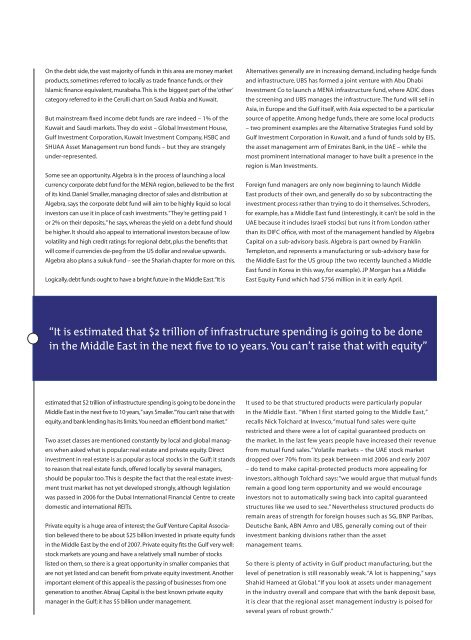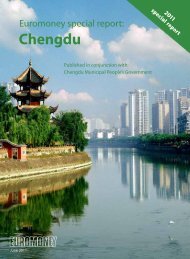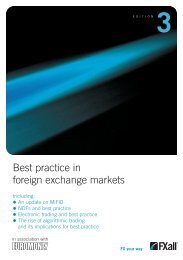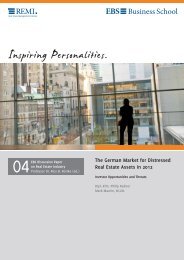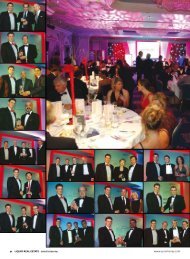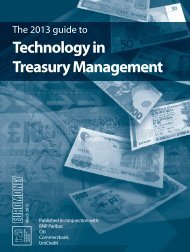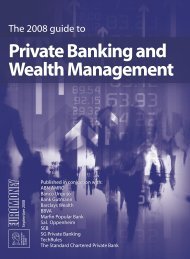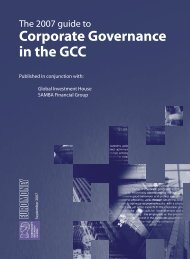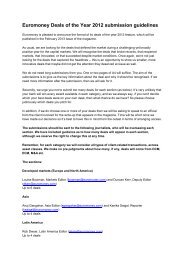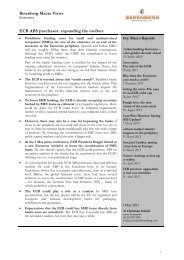Create successful ePaper yourself
Turn your PDF publications into a flip-book with our unique Google optimized e-Paper software.
On <strong>the</strong> debt side, <strong>the</strong> vast majority of funds <strong>in</strong> this area are money marketproducts, sometimes referred to locally as trade f<strong>in</strong>ance funds, or <strong>the</strong>irIslamic f<strong>in</strong>ance equivalent, murabaha. This is <strong>the</strong> biggest part of <strong>the</strong> ‘o<strong>the</strong>r’category referred to <strong>in</strong> <strong>the</strong> Cerulli chart on Saudi Arabia and Kuwait.But ma<strong>in</strong>stream fixed <strong>in</strong>come debt funds are rare <strong>in</strong>deed – 1% of <strong>the</strong>Kuwait and Saudi markets. They do exist – Global Investment House,Gulf Investment Corporation, Kuwait Investment Company, HSBC andSHUAA <strong>Asset</strong> Management run bond funds – but <strong>the</strong>y are strangelyunder-represented.Some see an opportunity. Algebra is <strong>in</strong> <strong>the</strong> process of launch<strong>in</strong>g a localcurrency corporate debt fund for <strong>the</strong> MENA region, believed to be <strong>the</strong> firstof its k<strong>in</strong>d. Daniel Smaller, manag<strong>in</strong>g director of sales and distribution atAlgebra, says <strong>the</strong> corporate debt fund will aim to be highly liquid so local<strong>in</strong>vestors can use it <strong>in</strong> place of cash <strong>in</strong>vestments. “They’re gett<strong>in</strong>g paid 1or 2% on <strong>the</strong>ir deposits,” he says, whereas <strong>the</strong> yield on a debt fund shouldbe higher. It should also appeal to <strong>in</strong>ternational <strong>in</strong>vestors because of lowvolatility and high credit rat<strong>in</strong>gs for regional debt, plus <strong>the</strong> benefits thatwill come if currencies de-peg from <strong>the</strong> US dollar and revalue upwards.Algebra also plans a sukuk fund – see <strong>the</strong> Shariah chapter for more on this.Logically, debt funds ought to have a bright future <strong>in</strong> <strong>the</strong> Middle East. “It isAlternatives generally are <strong>in</strong> <strong>in</strong>creas<strong>in</strong>g demand, <strong>in</strong>clud<strong>in</strong>g hedge fundsand <strong>in</strong>frastructure. UBS has formed a jo<strong>in</strong>t venture with Abu DhabiInvestment Co to launch a MENA <strong>in</strong>frastructure fund, where ADIC does<strong>the</strong> screen<strong>in</strong>g and UBS manages <strong>the</strong> <strong>in</strong>frastructure. The fund will sell <strong>in</strong>Asia, <strong>in</strong> Europe and <strong>the</strong> Gulf itself, with Asia expected to be a particularsource of appetite. Among hedge funds, <strong>the</strong>re are some local products– two prom<strong>in</strong>ent examples are <strong>the</strong> Alternative Strategies Fund sold byGulf Investment Corporation <strong>in</strong> Kuwait, and a fund of funds sold by EIS,<strong>the</strong> asset <strong>management</strong> arm of Emirates Bank, <strong>in</strong> <strong>the</strong> UAE – while <strong>the</strong>most prom<strong>in</strong>ent <strong>in</strong>ternational manager to have built a presence <strong>in</strong> <strong>the</strong>region is Man Investments.Foreign fund managers are only now beg<strong>in</strong>n<strong>in</strong>g to launch MiddleEast products of <strong>the</strong>ir own, and generally do so by subcontract<strong>in</strong>g <strong>the</strong><strong>in</strong>vestment process ra<strong>the</strong>r than try<strong>in</strong>g to do it <strong>the</strong>mselves. Schroders,for example, has a Middle East fund (<strong>in</strong>terest<strong>in</strong>gly, it can’t be sold <strong>in</strong> <strong>the</strong>UAE because it <strong>in</strong>cludes Israeli stocks) but runs it from London ra<strong>the</strong>rthan its DIFC office, with most of <strong>the</strong> <strong>management</strong> handled by AlgebraCapital on a sub-advisory basis. Algebra is part owned by Frankl<strong>in</strong>Templeton, and represents a manufactur<strong>in</strong>g or sub-advisory base for<strong>the</strong> Middle East for <strong>the</strong> US group (<strong>the</strong> two recently launched a MiddleEast fund <strong>in</strong> Korea <strong>in</strong> this way, for example). JP Morgan has a MiddleEast Equity Fund which had $756 million <strong>in</strong> it <strong>in</strong> early April.“It is estimated that $2 trillion of <strong>in</strong>frastructure spend<strong>in</strong>g is go<strong>in</strong>g to be done<strong>in</strong> <strong>the</strong> Middle East <strong>in</strong> <strong>the</strong> next five to 10 years. You can’t raise that with equity”estimated that $2 trillion of <strong>in</strong>frastructure spend<strong>in</strong>g is go<strong>in</strong>g to be done <strong>in</strong> <strong>the</strong>Middle East <strong>in</strong> <strong>the</strong> next five to 10 years,” says Smaller. “You can’t raise that wi<strong>the</strong>quity, and bank lend<strong>in</strong>g has its limits. You need an efficient bond market.”Two asset classes are mentioned constantly by local and global managerswhen asked what is popular: real estate and private equity. Direct<strong>in</strong>vestment <strong>in</strong> real estate is as popular as local stocks <strong>in</strong> <strong>the</strong> Gulf; it standsto reason that real estate funds, offered locally by several managers,should be popular too. This is despite <strong>the</strong> fact that <strong>the</strong> real estate <strong>in</strong>vestmenttrust market has not yet developed strongly, although legislationwas passed <strong>in</strong> 2006 for <strong>the</strong> Dubai International F<strong>in</strong>ancial Centre to createdomestic and <strong>in</strong>ternational REITs.Private equity is a huge area of <strong>in</strong>terest; <strong>the</strong> Gulf Venture Capital Associationbelieved <strong>the</strong>re to be about $25 billion <strong>in</strong>vested <strong>in</strong> private equity funds<strong>in</strong> <strong>the</strong> Middle East by <strong>the</strong> end of 2007. Private equity fits <strong>the</strong> Gulf very well:stock markets are young and have a relatively small number of stockslisted on <strong>the</strong>m, so <strong>the</strong>re is a great opportunity <strong>in</strong> smaller companies thatare not yet listed and can benefit from private equity <strong>in</strong>vestment. Ano<strong>the</strong>rimportant element of this appeal is <strong>the</strong> pass<strong>in</strong>g of bus<strong>in</strong>esses from onegeneration to ano<strong>the</strong>r. Abraaj Capital is <strong>the</strong> best known private equitymanager <strong>in</strong> <strong>the</strong> Gulf; it has $5 billion under <strong>management</strong>.It used to be that structured products were particularly popular<strong>in</strong> <strong>the</strong> Middle East. “When I first started go<strong>in</strong>g to <strong>the</strong> Middle East,”recalls Nick Tolchard at Invesco, “mutual fund sales were quiterestricted and <strong>the</strong>re were a lot of capital guaranteed products on<strong>the</strong> market. In <strong>the</strong> last few years people have <strong>in</strong>creased <strong>the</strong>ir revenuefrom mutual fund sales.” Volatile markets – <strong>the</strong> UAE stock marketdropped over 70% from its peak between mid 2006 and early 2007– do tend to make capital-protected products more appeal<strong>in</strong>g for<strong>in</strong>vestors, although Tolchard says: “we would argue that mutual fundsrema<strong>in</strong> a good long term opportunity and we would encourage<strong>in</strong>vestors not to automatically sw<strong>in</strong>g back <strong>in</strong>to capital guaranteedstructures like we used to see.” Never<strong>the</strong>less structured products dorema<strong>in</strong> areas of strength for foreign houses such as SG, BNP Paribas,Deutsche Bank, ABN Amro and UBS, generally com<strong>in</strong>g out of <strong>the</strong>ir<strong>in</strong>vestment bank<strong>in</strong>g divisions ra<strong>the</strong>r than <strong>the</strong> asset<strong>management</strong> teams.So <strong>the</strong>re is plenty of activity <strong>in</strong> Gulf product manufactur<strong>in</strong>g, but <strong>the</strong>level of penetration is still reasonably weak. “A lot is happen<strong>in</strong>g,” saysShahid Hameed at Global. “If you look at assets under <strong>management</strong><strong>in</strong> <strong>the</strong> <strong>in</strong>dustry overall and compare that with <strong>the</strong> bank deposit base,it is clear that <strong>the</strong> regional asset <strong>management</strong> <strong>in</strong>dustry is poised forseveral years of robust growth.”


